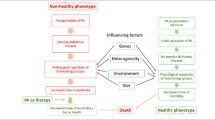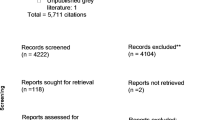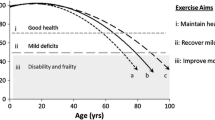Abstract
The aim of this systematic review was to investigate the longitudinal relationship between physical activity (PA) and the psychological domains of well-being in older adults and to identify possible moderators and mediators of this relationship. Twelve longitudinal investigations were included in this review. The results indicate that there seems to be a positive association between PA and psychological well-being over time. Thus PA may be one possible individual lifestyle factor for the long-term promotion of psychological well-being in older adults. Especially leisure time PA at light intensities conducted in group settings was identified to be beneficial for promoting psychological well-being. Furthermore, longitudinal results indicated that self-efficacy, self-esteem, affect, optimism, and pre-interventional motivation moderated/mediated the relationship between PA and psychological well-being in older adults.
Zusammenfassung
Ziel dieses systematischen Reviews war es, die längsschnittliche Assoziation zwischen körperlicher Aktivität und dem psychischen Wohlbefinden bei älteren Erwachsenen zu untersuchen und mögliche Moderatoren und Mediatoren dieser Beziehung zu identifizieren. Zwölf Längsschnittstudien konnten in das Review einbezogen werden. Die Ergebnisse deuten darauf hin, dass ein positiver Zusammenhang zwischen körperlicher Aktivität und dem psychischen Wohlbefinden über die Zeit besteht. Somit kann körperliche Aktivität als ein potenzieller individueller Lebensstilfaktor für die langfristige Förderung des psychischen Wohlbefindens bei älteren Erwachsenen angesehen werden. Es scheint, dass sich vor allem Freizeitaktivitäten mit niedriger Intensität, die in Gruppen durchgeführt werden, positiv auf das psychische Wohlbefinden auswirken. Des Weiteren zeigen die längsschnittlichen Ergebnisse, dass Selbstwirksamkeit, Selbstwertgefühl, Affekt, Optimismus und die Motivation vor Interventionsbeginn einen Einfluss auf die Beziehung zwischen körperlicher Aktivität und psychologischem Wohlbefinden bei älteren Personen haben.

Similar content being viewed by others
References
Baltes, P. B., & Baltes, M. M. (1990). Psychological perspectives on successful aging: the model of selective optimization with compensation. Successful aging. Perspectives from the behavioral sciences, 1, 1–34.
Beard, J. G., & Ragheb, M. G. (1980). Measuring leisure satisfaction. Journal of leisure Research, 12(1), 20.
Bilotta, C., Bowling, A., Case, A., Nicolini, P., Mauri, S., Castelli, M., & Vergani, C. (2010). Dimensions and correlates of quality of life according to frailty status: a cross-sectional study on community-dwelling older adults referred to an outpatient geriatric service in Italy. Health and quality of life outcomes, 8, 56. https://doi.org/10.1186/1477-7525-8-56.
Bilotta, C., Bowling, A., Nicolini, P., Case, A., Pina, G., Rossi, S. V., & Vergani, C. (2011). Older People’s Quality of Life (OPQOL) scores and adverse health outcomes at a one-year follow-up. A prospective cohort study on older outpatients living in the community in Italy. Health and quality of life outcomes, 9, 72. https://doi.org/10.1186/1477-7525-9-72.
Buckworth, J., & Tomporowski, P. (2013). Exercise psychology: Human kinetics
Carver, C. S., Scheier, M. F., & Segerstrom, S. C. (2010). Optimism. Clinical psychology review, 30(7), 879–889. https://doi.org/10.1016/j.cpr.2010.01.006.
Clow, A., & Edmunds, S. (2014). Physical activity and mental health: human kinetics
Diener, E. (2009). Subjective well-being. In A. C. Michalos & E. Diener (Eds.), The science of well-being vol. 37 (pp. 11–58). Dordrecht: Springer.
Dyrstad, S. M., Hansen, B. H., Holme, I. M., & Anderssen, S. A. (2014). Comparison of self-reported versus accelerometer-measured physical activity. Medicine & Science in Sports & Exercise, 46(1), 99–106.
Elavsky, S., McAuley, E., Motl, R. W., Konopack, J. F., Marquez, D. X., Hu, L., Jerome, G. J., & Diener, E. (2005). Physical activity enhances long-term quality of life in older adults: efficacy, esteem, and affective influences. Annals of Behavioral Medicine, 30(2), 138–145.
Friedman, E. M., Ruini, C., Foy, R., Jaros, L., Sampson, H., & Ryff, C. D. (2017). Lighten UP! A community-based group intervention to promote psychological well-being in older adults. Aging & mental health, 21(2), 199–205. https://doi.org/10.1080/13607863.2015.1093605.
Gale, C. R., Cooper, C., Deary, I. J., & Sayer, A. A. (2014). Psychological well-being and incident frailty in men and women: the English Longitudinal Study of Ageing. Psychological medicine, 44(4), 697–706. https://doi.org/10.1017/s0033291713001384.
Hagstromer, M., Ainsworth, B. E., Oja, P., & Sjostrom, M. (2010). Comparison of a subjective and an objective measure of physical activity in a population sample. Journal of Physical Activity and Health, 7(4), 541–550.
Han, W.-J., & Shibusawa, T. (2015). Trajectory of physical health, cognitive status, and psychological well-being among Chinese elderly. Archives of gerontology and geriatrics, 60(1), 168–177.
Heo, J., Culp, B., Yamada, N., & Won, Y. (2013). Promoting successful aging through competitive sports participation: insights from older adults. Qualitative health research, 23(1), 105–113. https://doi.org/10.1177/1049732312457247.
Higgins, J. P., & Green, S. (2011). Cochrane handbook for systematic reviews of interventions. Vol. 4. Hoboken: John Wiley & Sons.
van Hoecke, A.-S., Delecluse, C., Bogaerts, A., & Boen, F. (2014a). Effects of need-supportive physical activity counseling on well-being: a 2-year follow-up among sedentary older adults. Journal of physical activity & health, 11(8), 1492–1502. https://doi.org/10.1123/jpah.2012-0497.
van Hoecke, A.-S., Delecluse, C., Bogaerts, A., & Boen, F. (2014b). The long-term effectiveness of need-supportive physical activity counseling compared with a standard referral in sedentary older adults. Journal of aging and physical activity, 22(2), 186–198. https://doi.org/10.1123/japa.2012-0261.
Kahana, E., Lawrence, R. H., Kahana, B., Kercher, K., Wisniewski, A., Stoller, E., Tobin, J., & Stange, K. (2002). Long-term impact of preventive proactivity on quality of life of the old-old. Psychosomatic medicine, 64(3), 382–394.
Kim, E. S., Kubzansky, L. D., Soo, J., & Boehm, J. K. (2016a). Maintaining healthy behavior: a prospective study of psychological well-being and physical activity. Annals of Behavioral Medicine: a Publication of the Society of Behavioral Medicine. https://doi.org/10.1007/s12160-016-9856-y.
Kim, J., Lee, S., Chun, S., Han, A., & Heo, J. (2016b). The effects of leisure-time physical activity for optimism, life satisfaction, psychological well-being, and positive affect among older adults with loneliness. Annals of Leisure Research, 8(1), 1–10. https://doi.org/10.1080/11745398.2016.1238308.
Ku, P.-W., Fox, K. R., & McKenna, J. (2008). Assessing subjective well-being in Chinese older adults: the Chinese aging well profile. Social Indicators Research, 87(3), 445–460.
Ku, P.-W., Fox, K. R., Chang, C.-Y., Sun, W.-J., & Chen, L.-J. (2014). Cross-sectional and longitudinal associations of categories of physical activities with dimensions of subjective well-being in Taiwanese older adults. Social Indicators Research, 117(3), 705–718. https://doi.org/10.1007/s11205-013-0394-8.
Ku, P.-W., Fox, K. R., & Chen, L.-J. (2016a). Leisure-Time Physical Activity, Sedentary Behaviors and Subjective Well-Being in Older Adults: An Eight-Year Longitudinal Research. Social Indicators Research, 127(3), 1349–1361. https://doi.org/10.1007/s11205-015-1005-7.
Ku, P.-W., Fox, K. R., Liao, Y., Sun, W.-J., & Chen, L.-J. (2016b). Prospective associations of objectively assessed physical activity at different intensities with subjective well-being in older adults (pp. 2909–2919). https://doi.org/10.1007/s11136-016-1309-3. Quality of life research: an international journal of quality of life aspects of treatment, care and rehabilitation, 25(11)
Kunzmann, U., Little, T. D., & Smith, J. (2000). Is age-related stability of subjective well-being a paradox?: cross-sectional and longitudional evidence from the Berlin Aging Study. Psychology and aging, 15(3), 511–526. https://doi.org/10.1037//0882-7974.15.3.511.
Lee, C., & Russell, A. (2003). Effects of physical activity on emotional well-being among older effects of physical activity on emotional well-being among older Australian women. Cross-sectional and longitudinal analyses. Journal of Psychosomatic Research, 54, 155–160.
Lu, L. (2011). Leisure experiences and depressive symptoms among Chinese older people: a national survey in Taiwan. Educational Gerontology, 37(9), 753–771.
Markides, K. S., Dickson, H. D., & Pappas, C. (1982). Characteristics of dropouts in longitudinal research on aging: a study of Mexican Americans and Anglos. Experimental Aging Research, 8(3), 163–167.
Mavrovouniotis, F. H., Argiriadou, E. A., & Papaioannou, C. S. (2010). Greek traditional dances and quality of old people’s life. Journal of bodywork and movement therapies, 14(3), 209–218. https://doi.org/10.1016/j.jbmt.2008.11.005.
McAuley, E., & Morris, K. S. (2007). State of the art review: advances in physical activity and mental health: quality of life. American Journal of Lifestyle Medicine, 1(5), 389–396. https://doi.org/10.1177/1559827607303243.
Netz, Y., Wu, M.-J., Becker, B. J., & Tenenbaum, G. (2005). Physical activity and psychological well-being in advanced age: a meta-analysis of intervention studies. Psychology and aging, 20(2), 272–284. https://doi.org/10.1037/0882-7974.20.2.272.
Nordbakke, S., & Schwanen, T. (2013). Well-being and mobility: a theoretical framework and literature review focusing on older people. Mobilities, 9(1), 104–129. https://doi.org/10.1080/17450101.2013.784542.
Olson, E. A., Fanning, J. T., Awick, E. A., Chung, H. D., & McAuley, E. (2014). Differential trajectories of well-being in older adult women: the role of optimism. Applied psychology. Health and well-being, 6(3), 362–380. https://doi.org/10.1111/aphw.12033.
Ostir, G. V., Ottenbacher, K. J., & Markides, K. S. (2004). Onset of frailty in older adults and the protective role of positive affect. Psychology and aging, 19(3), 402–408. https://doi.org/10.1037/0882-7974.19.3.402.
Östlund, B. (2010). Watching television in later life: a deeper understanding of TV viewing in the homes of old people and in geriatric care contexts. Scandinavian journal of caring sciences, 24(2), 233–243.
Pasco, J. A., Williams, L. J., Jacka, F. N., Henry, M. J., Coulson, C. E., Brennan, S. L., Leslie, E., Nicholson, G. C., Kotowicz, M. A., & Berk, M. (2011). Habitual physical activity and the risk for depressive and anxiety disorders among older men and women. International psychogeriatrics, 23(2), 292–298. https://doi.org/10.1017/s1041610210001833.
Rejeski, W. J., & Mihalko, S. L. (2001). Physical activity and quality of life in older adults. Journals of Gerontology: Series A, 56 A(Special Issue 11), 23–35.
Ryff, C. D., Dienberg, L. G., Urry, H. L., Muller, D., Rosenkranz, M. A., Friedman, E. M., Davidson, R. J., & Singer, B. (2006). Psychological well-being and ill-being: do they have distinct or mirrored biological correlates? Psychotherapy and psychosomatics, 75(2), 85–95. https://doi.org/10.1159/000090892.
Schüz, B., Wurm, S., Warner, L. M., & Tesch-Römer, C. (2009). Health and subjective well-being in later adulthood: different health states-different needs? Applied Psychology: Health and Well-Being, 1(1), 23–45. https://doi.org/10.1111/j.1745-7254.2007.00657.x-i1.
Solberg, P. A., Halvari, H., Ommundsen, Y., & Hopkins, W. G. (2014). A 1‑year follow-up of effects of exercise programs on well-being in older adults. Journal of aging and physical activity, 22(1), 52–64. https://doi.org/10.1123/japa.2012-0181.
Spirduso, W. W., & Cronin, D. L. (2001). Exercise dose-response effects on quality of life and independent living in older adults. Med. Sci. Sports Exerc, 33(6), S598–S608.
Tunstall-Pedoe, H. (2006). Preventing chronic diseases. A vital investment: WHO global report (p. 200). Geneva: World Health Organization. CHF 30.00. ISBN 92 4 1563001. Also published on http://www.who.int/chp/chronic_disease_report/en. International Journal of Epidemiology, 35(4), 1107. https://doi.org/10.1093/ije/dyl098
Urry, H. L., Nitschke, J. B., Dolski, I., Jackson, D. C., Dalton, K. M., Mueller, C. J., Rosenkranz, M. A., Ryff, C. D., Singer, B. H., & Davidson, R. J. (2004). Making a life worth living: neural correlates of well-being. Psychological science, 15(6), 367–372. https://doi.org/10.1111/j.0956-7976.2004.00686.x.
Vagetti, G. C., Barbosa Filho, V. C., Moreira, N. B., Oliveira, V. D., Mazzardo, O., & Campos, W. D. (2014). Association between physical activity and quality of life in the elderly: a systematic review, 2000–2012. Revista Brasileira de Psiquiatria, 36(1), 76–88.
Verbrugge, L. M., & Jette, A. M. (1994). The disablement process. Social Science & Medicine, 38(1), 1–14.
Wells, G., Shea, B., O’Connell, D., Peterson, J., Welch, V., Losos, M., & Tugwell, P. (2014). Newcastle-Ottawa quality assessment scale, cohort studies
Author information
Authors and Affiliations
Corresponding author
Ethics declarations
Conflict of interest
I. Bragina and C. Voelcker-Rehage declare that they have no competing interests.
This article does not contain any studies with human participants or animals performed by any of the authors.
Rights and permissions
About this article
Cite this article
Bragina, I., Voelcker-Rehage, C. The exercise effect on psychological well-being in older adults—a systematic review of longitudinal studies. Ger J Exerc Sport Res 48, 323–333 (2018). https://doi.org/10.1007/s12662-018-0525-0
Received:
Accepted:
Published:
Issue Date:
DOI: https://doi.org/10.1007/s12662-018-0525-0




